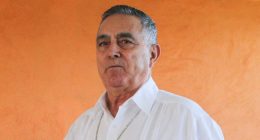The Guardian’s West Africa correspondent Emmanuel Akinwotu reports from the protests against the special anti-robbery squad (Sars), which have swept Nigeria and gained international support. For years, the police unit has been plagued with allegations of extrajudicial killings and abuse
The Guardian’s West Africa correspondent Emmanuel Akinwotu tells Rachel Humphreys about the wave of protests which have erupted across Nigeria and captured global attention. The cries for change in Nigeria, largely from a younger generation, have centred around calls for an end to the notorious special anti-robbery squad (Sars), a police unit who have long been accused of extrajudicial killings, torture and extortion.
Last week, according to witnesses, dozens of soldiers disembarked from at least four trucks flanked by police officers and approached the scene of a major protest site where more than a thousand people had taken over a toll gate in Lekki, a large district in Lagos Island. Amnesty International said at least 12 people were killed by soldiers and police in the shootings which left many in Nigeria and across the world reeling. The visibility of the carnage, which has since been widely described as the “Lekki Massacre”, has fuelled outrage at the Nigerian government and security forces for clamping down on one of the most striking protest movements in decades in Nigeria. In an effort to quell unrest, the government announced the unit would be disbanded, and promised a host of reforms. But many demonstrators are sceptical of government promises without clearly specified timeframes.




